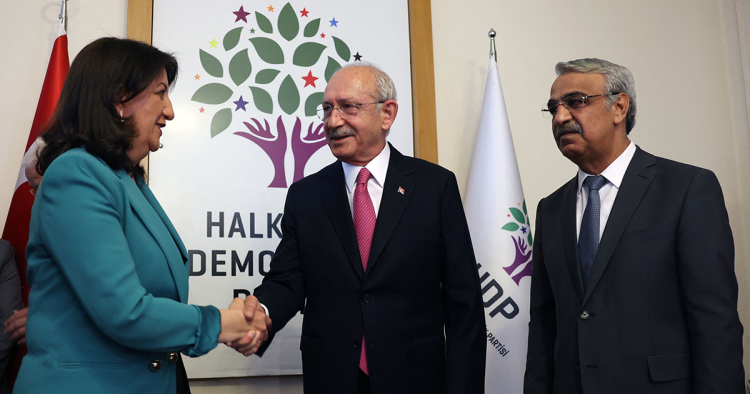MEI's Turkish Election Watch series, a weekly update on the latest developments about Turkey's upcoming presidential and parliamentary vote, will run until the conclusion of the elections in May.
HDP takes sides without taking sides
Perhaps the most important development in Turkey’s elections this week was the decision of the pro-Kurdish Peoples’ Democratic Party (HDP) to forego fielding a candidate for president. This decision amounts to tacit support for the opposition candidate, Kemal Kiliçdaroğlu, and holds the potential for allowing the opposition a victory in the first round of the presidential election. In Turkish elections, if no candidate for president receives a majority in the first round, a run-off is held. Many in the opposition fear that, if the Justice and Development Party (AKP) and its allies win in parliament (where they have an electoral advantage), they would have a stronger case for the presidency based on the goal of “unified government.” Others worry that, if the opposition does not win a clear victory in the May 14 elections, Recep Tayyip Erdoğan and his allies could resort to extralegal means — perhaps including manufactured street violence — to maintain their hold on power. Within the opposition coalition, however, tensions remain over the de facto alliance with the HDP; the nationalist Good (İyi) Party has repeatedly voiced its discomfort, though the alliance has so far held.
The dark horse candidate
It is unclear exactly why Muharrem İnce, a onetime Republican People’s Party politician and the opposition candidate in the 2018 presidential election, is running again. While İnce is a strong public speaker and has a knack for hard-knuckled politicking, it is unclear how much popular support he can muster. He seems to hope that he can be an alternative candidate to those who want a break from Erdoğan, but cannot manage to bring themselves to support Kiliçdaroğlu. The opposition certainly is not happy. For them, it muddies the water of an election that they hope will be a straightforward referendum on Erdoğan’s misrule. Moreover, İnce’s candidacy could undermine the opposition’s support in some parliamentary districts, giving the advantage to the AKP. Even if İnce wins only one or two percentage points, it increases the chance that the presidential election goes to a run-off, which many in the opposition fear would sharpen Erdoğan’s willingness to initiate a crisis to improve his odds of victory.
The AKP has a coalition too!
The AKP has, since 2018, ruled in a coalition with the Nationalist Action Party. This “People’s Alliance” (Cumhur Ittifaki) has attempted to expand its coalition with a number of smaller nationalist and religious parties. There has been more than a whiff of desperation in its efforts, however. Most recently, Erdoğan accepted Hüda Par, an offshoot of the Sunni Kurdish Islamist group Hezbollah with ties to Iran and a considerable record of criminal activity and political violence, into his People’s Alliance. On March 24, the New Welfare Party (YRP), like the AKP a successor to the Welfare Party of the 1990s, also joined the alliance. Considerably more overtly Islamist than the AKP, YRP has called for the restoration of the Caliphate and is strongly anti-Western. Its leader, Fatih Erbakan, has described feminism as a sort of fascism. The inclusion of these groups in the coalition underlines Erdoğan’s own desperation: the election appears set to be a very tight one. Courting these fringe parties is a sign that Erdoğan knows he needs to pull out all the stops. It also suggests that if his ruling coalition wins in May, there will be significant pressure from these new allies for more dramatically radical policies going forward. As the price for its participation in the coalition, for example, YRP has demanded the abolition of the Law to Protect Family and Prevent Violence Against Women, which was originally enacted in 2012 and provides for such basic protections as government-sponsored shelters.
Howard Eissenstat is a non-resident scholar with MEI's Turkey Program and an associate professor of history at St. Lawrence University, where he teaches courses on Middle East history and politics.
Photo by ADEM ALTAN/AFP via Getty Images
The Middle East Institute (MEI) is an independent, non-partisan, non-for-profit, educational organization. It does not engage in advocacy and its scholars’ opinions are their own. MEI welcomes financial donations, but retains sole editorial control over its work and its publications reflect only the authors’ views. For a listing of MEI donors, please click here.













